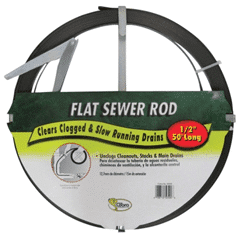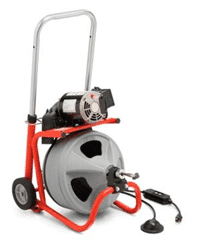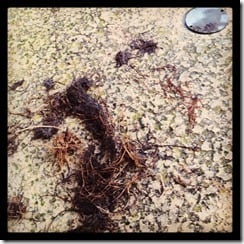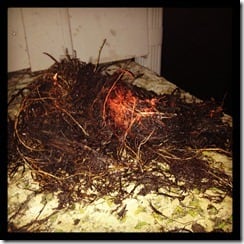I have a bit of a “crappy” story to tell. Literally. And it doesn’t have to do with technology, it involves sewage. I believe that the house that I own has plumbing possessed by Mother Nature. Ever since we have owned our home, there is an annual tradition (sometimes more than once a year) where we have to call out a plumber to snake or clean our our main sewer line coming from our house and running to the municipal sewage line.
Without fail, and usually at night or on the weekend or during the holidays, our sewer line would back up spewing liquid hell all over. I won’t go into the details in case you have a weak stomach.
For several years, after I spent hours with a bottle of bleach, a mop and a lot of curse words, I would contact a local plumbing company to have them clean out our main line. It was an expensive tradition and one that I was hoping to avoid on a recurring basis.
So I decided to take the matters into my own hands. Again, literally.
Any time that I have had a professional doing work at my house, I watch and ask a lot of questions. The service professionals are experts at what they do (hopefully) and over the years, I have found that they do enjoy talking about their trade. I’ve learned tips and tricks about things over the years that I would never have known. The last time I had a plumber out, for example, I learned how to fix a leaking garden faucet.
I felt that after the numerous visits by the plumbing service, I was much more of an “expert” so I decided to purchase a 50 ft ribbon steel snake so that I could clean out the drain myself. With regular checks of our main line and plenty of “disasters” where I missed the telltale signs that things were blocking up, I was able to mitigate and resolve many of these backups.
Using this “ribbon snake” is quite a bit of work. It is fully manual labor of ramming the snake through the drainpipe repeatedly. For the past coupled of years, this painful process seemed to work and the $50 snake paid for itself after just one successful use.
But this year, Mother Nature reared her powerful head and spread her roots, again literally, and my trusty ribbon snake failed to perform. After hours of sweat, and achy back, arms and hands and a lot of cursing, I decided it was time to upgrade my attack.
I purchased a “professional level” electric drain cleaner, the Rigid K-400 Drain Cleaner. (Ok, yes, there is a bit of technology involved in this article.) It has a 75 foot 3/8 inch wound solid core cable with an electric motor, complete with a foot pedal to turn the motor on and off.
At $500, this was a costly investment. But I was committed now. I was determined to conquer whatever evil was lurking in the dark, remote pipes deep underground. I watched the how-to videos that came with the electric auger and thought back about how the professional plumber had done his trade, how long it took and how to approach things. Then I set to work.
After a few hours each day for two days, I managed to unclog the drain. Flow had been restored and I had removed a bunch of roots from the main line. I was ecstatic (as was my family). I felt like a pro!
But I was still paranoid. I kept checking the main line to see if there was any water build up. For a day, I basked in pure DIY plumbing glory. Then a night later, I checked again. And I saw water backing up. I was defeated. So I set to work again.
This time, however, I think I learned the Zen of Plumbing.
When you snake or clean out a sewage line, you use your senses much differently than you would traditionally. As humans, we most typically rely on our eyes for feedback. But when you send a coil of steel down into a dark hole, suddenly you are blind. You are forced to use your other less developed senses much more: touch, hearing and even smell.
If you have ever stuck your finger down a hole to fish something out from the bottom, you have gotten a glimpse at how using an auger works. It is all done by touch. Think of the long snake as an extension of your hands and fingers. Over time, doing this “snaking” or cleaning process, you learn to feel for resistance or when the snake line begins to build up tension or starts to twist. You learn to stop, reverse what you are doing, and try again. Over time, you can begin to tell the difference as to when you have unclogged something and if you have hair or roots twisted around the end of the auger. You begin to enter that Zen state of plumbing.
Then there is that listening process. You learn what water sounds like rushing down a clear pipe and when bubble sounds means that you still have work to do. In my pipe, when I flush a toilet, I can hear the water rushing all the way (100 feet?) down to the municipal portion of the pipe. It’s a sort of distant rumbling. Sometimes you can even feel a light breeze as the water passes through.
And finally there is the smell. This one is pretty obvious. You learn what a clog smells like and different types of blockages. This last time that I pulled almost double or triple the amount of roots from my main line, I could smell nature – that of freshly broken roots, long before I pulled the end of the snake out.
As of this writing, my main line is free of roots, or so I hope. So I feel happy. But what I’m more excited about, and the reason I shared this story, is because of what I learned along my journey and the appreciation and respect I have built for service and trade professionals.
My recommendation, the next time you have a professional out to fix, build or install something at your home, spend some time with them. Ask them if you can watch and ask questions. Offer to help (without getting in the way). And most importantly, respect their knowledge and expertise. You will be surprised at what you can learn and potentially implement on your own in the future.
HTD says: I got to the “root” of my plumbing problem and gained a new respect and insight in the process!








1 comment
Ken Adams
Great article. I like your advice as well. Repair men, plumbers, roofers, etc… often get a bad name because of one bad experience. But like you said, the majority are full of knowledge and like to share it with people. You can even probably save yourself some other repairs by asking questions and heeding any advice they may give. Plumbers Columbia SC